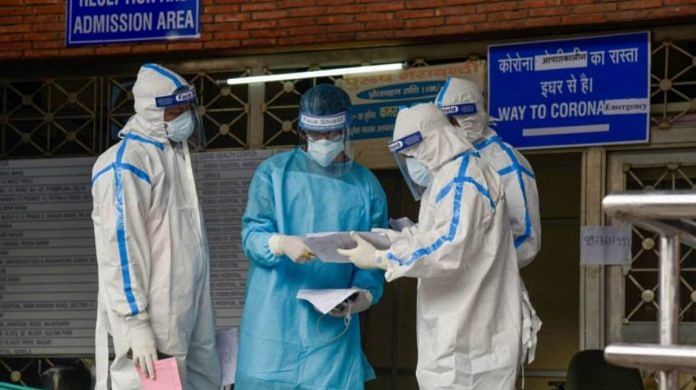New Delhi: With decreasing fatality rates and a number of drugs showing promise in treating Covid-19, the news around the coronavirus pandemic is starting to look better — if one looks beyond the absolute numbers, ThePrint’s Editor-in-Chief Shekhar Gupta said.
In episode 525 of Cut The Clutter, Gupta points out that by and large the news on coronavirus globally is better than it was a few weeks ago.
“If we look at the picture in absolute numbers, India’s getting worse and is in a very bad state,” Gupta said. However, Brazil, which is about a seventh of India’s population, has three times as many dead, while the US, which has less than one fourth of India’s population, has almost six times as many deaths.
Moreover, India has ramped up its Covid-19 testing and fatality rate is going down. This is the case not only in India, but all over the world.
This may be happening because with more testing, more cases are being recorded — which brings down the percentage of deaths.
Studies now show that more people who are in ICU for Covid-19 are now surviving, suggesting that the treatments for the disease is improving.
Gupta reiterates that this does not mean that people should stop taking precautions such as physical distancing and wearing masks.
He also said that according to some virologists, there may be over 50 lakh undetected cases in India. If that were to be true, the fatality rate of the disease is even lower — possibly around 0.5 per cent.
“We should now stop looking at case numbers. Case numbers are now a misleading metric. We should now look at fatalities rates, because the important thing is to reduce deaths, to reduce fatalities,” Gupta said.
Also read: Human trials of Bharat Biotech’s Covid vaccine Covaxin begin in Rohtak
Cocktail of treatments
With the improved understanding of how the virus affects our bodies, more and more drugs have been given emergency use approval in many countries.
It is now well established that the Covid-19 deaths happen because of the overreaction of our body’s immune system, which results in what is known as the cytokines storm — toxic proteins that damage the body’s tissues and healthy organs.
A number of treatments that currently show promise against Covid-19 are those that dampen this overreaction of the immune system.
Hydroxychloroquine (HCQ), which has been the centre of much controversy, works by dampening the cytokines storm.
The WHO has stopped the trials of this drug, but countries like India and Brazil continue to use it. Recently, India’s two leading experts M.S. Sheshadri and T. Jacob John wrote about new evidence emerging from the US, which showed that HCQ — at much lower doses than what WHO trials had been administering — could reduce the risk of death significantly.
Dexamethasone, a low-cost steroid, has also shown it can reduce mortality.
In their article, Sheshadri and John wrote that “Indian physicians have a golden opportunity to use the three modalities in sequence — dexamethasone in those who do not improve with early use of HCQ and convalescent plasma for those who do not improve with dexamethasone.”
Similarly tocilizumab, an immunosuppressive drug used for treatment of rheumatoid arthritis, has been given emergency approval. This drug inhibits a protein known as interleukin-6 (IL-6) receptor. IL-6 is a cytokine that causes inflammation.
Itolizumab works by binding to a protein called CD-6, a protein found in the outer membrane of T-cell. T-cell is a type of white blood cell that plays a central role in the body’s immune response.
Protein CD6 is important for the continued activity of T-Cells when the body encounters a foreign pathogen.
Itolizumab prevents the cytokines storm from being unleashed in the first place.
“What this drug has got is an emergency approval. Now this has to go through larger tests and larger trials … the small trial they’ve carried out so far as a proof of concept,” Gupta said.
Looking at the basic science of the disease, it is logical that immunomodulators and immunosuppressants can work, he added.
“Six weeks back, doctors had no ammunition, no gun to fire at the coronavirus. They were blindfolded. Today they are not blindfolded. They have a machine gun with a choice of many bullets,” Gupta said.
“No bullet is a sure shot, but certainly we are much better off than before,” he said.
Watch the full CTC episode here:
Also read: The four known ways in which the coronavirus affects your brain



